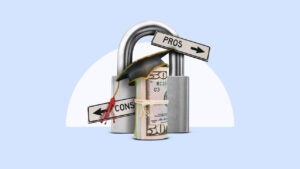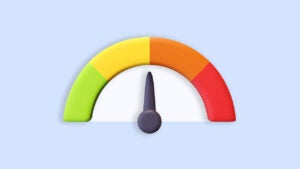What credit score is needed for a student loan?




Key takeaways
- Federal student loans don’t have minimum credit score requirements, and most of them don’t require a credit check.
- Private student loans generally require the borrower or their cosigner to have a credit score of at least 640.
- Minimum credit score requirements for private student loans vary by lender.
Student loans are one of very few types of financing where your credit score doesn’t dictate your ability to borrow if you take out federal student loans. There is no student loan credit score requirement for federal student loans unless you take out a Direct PLUS loan for graduate or professional degrees or are the parents of undergraduate students.
However, private student loan lenders — typically offered by banks, credit unions and online lenders — often require a credit score of at least 640. The qualification process for private student loans may vary slightly from lender to lender. However, the higher your credit score, the more likely you are to qualify and obtain a competitive interest rate.
What credit score do you need for federal student loans?
Federal student loans do not have any credit score requirements. That’s good news for students, since most people entering college don’t have established credit histories.
The advantage of federal loans is that most students can qualify for funding if needed, and the interest rate is the same regardless of your credit score or lack of credit history. Poor scores won’t affect your loan rate or terms for a federal student loan.
It is worth noting that the government does an adverse credit check for federal PLUS loans. Although there is no credit score requirement, you might need to add an endorser (equivalent to a cosigner) if your credit history includes bankruptcy, foreclosure, serious delinquency or loan charge offs.
What credit score do you need for private student loans?
Private student loans, including refinance loans, usually require a credit score of at least 640.
Many people turn to private lenders for additional funding if they don’t qualify for enough federal funding to pay for their school expenses.
Unlike federal student loans, your credit score will impact the rate you’re offered. The best private student loan rates are just below 3.5 percent and typically only go to excellent-credit borrowers. However, fair or poor credit score borrowers may face rates above 17 percent, depending on the lender.
Some lenders offer prequalification, which allows you to see if you are eligible for a student loan without the lender pulling a hard check on your credit. That allows you to see if you qualify without lowering your credit score. Take advantage of prequalification whenever possible when shopping with private lenders.
| Lender | Credit score required |
|---|---|
| College Ave | Not Specified |
| Earnest | 650 |
| SoFi | 640 |
| ELFI (Education Loan Finance) | 680 |
How your credit score influences your student loan rate
Your credit score doesn’t affect the rate you’re offered for a federal student loan. However, when you apply for a private student loan, your credit score could mean the difference between a single-digit or double-digit interest rate. Although lenders use various credit scoring models, most of them consider your FICO score when reviewing your application.
A good credit score — often defined as a FICO score 670 or higher — usually won’t get you the lowest private student loan rate. You’ll typically need an excellent credit rate, along with all-around solid financials, to qualify for the lowest advertised rates.
In addition, if you have poor or minimal credit, your chances of qualifying without a cosigner are much lower than someone with good credit. Generally, the higher your credit score, the better your approval odds and chances of qualifying for the lenders’ lowest rates.
Can you get a student loan with bad credit?
If you’re applying for an undergraduate student loan on your own, you’re likely to get a federal student loan with bad credit. Graduate students and parents applying for the Direct PLUS loans may have difficulty getting a loan if they have bad credit.
Because private student loans are backed by banks and financial institutions, bad credit could make it tougher to get approved. If you intend to pursue private loans with a poor credit score, start by shopping around and looking for lenders that have more flexible credit score requirements.
A cosigner with a good credit history could improve your odds of getting a private loan if your credit score is low. If you choose to take this approach, be sure the cosigner understands that their credit is on the line should you default on the loan.
- Visit FreeCreditScore.com, a website owned by Experian, or myFICO.com. Some websites offer paid access that comes with additional perks like access to multiple credit scores.
- Check your credit card benefits. Many credit card issuers, like American Express, provide free credit score access to card members.
- Obtain a copy of your credit report. This contains the details of your credit history, including bill payments and debts. Lenders use this information to determine whether you will receive a loan and what kind of rate you will receive. Check your credit report to ensure there are no errors that could negatively impact your score.
How to improve your credit score
Taking steps to boost your credit before applying for a private student loan may increase your approval chances and result in a lower rate. The most important step you can take is paying all of your bills on time — payment history represents 35 percent of your FICO credit score.
Another action you can take is to keep revolving debt balances (like credit cards) as low as possible. The amount you owe accounts for 30 percent of your FICO score. This is your credit utilization ratio, and the lower it is, the higher your credit score will be.
Bottom line
Unless you’re applying for a private student loan, your credit score will not be a factor to finance your higher education costs. If you need a private student loan and have less-than-ideal credit, consider finding a cosigner with a strong credit profile. If you don’t need the private loan right away, work on improving your score first so that you qualify for the most competitive student loan interest rate possible.
Why we ask for feedback Your feedback helps us improve our content and services. It takes less than a minute to complete.
Your responses are anonymous and will only be used for improving our website.
You may also like

Pros and cons of private student loans

What credit score do I need for a business loan?

What is the average credit score for personal loans?

